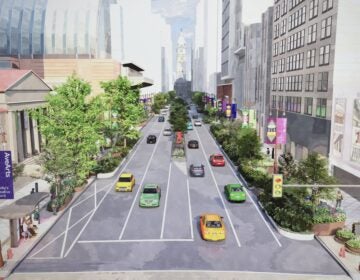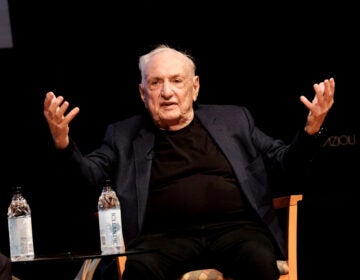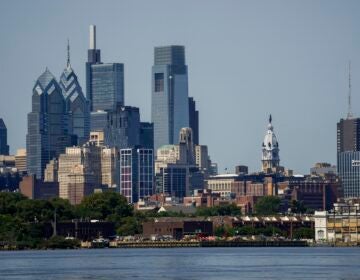Student competition topic is also the goal of a new non-profit
The teams competing for this year’s Ed Bacon Student Design Competition took on a subject that event organizers say Philadelphia must soon tackle if the city where the nation was born is to be the epicenter of the country’s 250th birthday party.
University-level students from all disciplines were asked to imagine an international World’s Fair style celebration in Philadelphia, with activity centered in South Philadelphia, near the airport, stadiums, a fort and FDR Park. A team from Cornell University won first place with their design, called Confluence Philadelphia 2026, a venue that reflected not only a positive effect for the city in 2026, but also a lasting legacy.
It marked the second year in a row that a team from Cornell won the design competition.
Second place was awarded to a team from the University of Massachusetts, Amherst.
The annual Bacon awards pay homage to a professional each year, too. And for the first time, the winner of the Edmund N. Bacon Prize is a Philadelphian: Denise Scott Brown, principal of Venturi, Scott Brown & Associates and author of Learning from Las Vegas.
Denise Scott Brown talked about the days at the University of Pennsylvania with Bacon and Louis Kahn. She spoke openly about her disagreements with Bacon, and wondered what he’d think about her receiving his award. She was introduced by Don Jones of Ewing Cole. Hilda Bacon also spoke about her father, and how he would have loved the competition and the students’ enthusiastic work.
The student competition assignment was suggested by Andrew Hohns, a finance guy who ten years ago founded Young Involved Philadelphia and has more recently founded USA250, a non-profit organization aimed at not only bringing a year’s worth of exhibitions in technology, sports, culture, history and the lively arts here, but using the celebration as a mechanism for attracting investment in the city’s infrastructure from corporations, foundations, and other nations.
“I don’t really see on the horizon many events that have the transformative capacity in terms of renewing infrastructure apart from USA 250,” Hohns said. “We have an opportunity to seize it.”
Other topics were also considered, said Greg Heller, Bacon Foundation president. But a committee made up of Bacon Foundation and Center for Architecture board members – the Bacon Foundation is now part of the Center for Architecture – thought this was exactly right.
“We are always looking for an area in Philadelphia where there is interest in a design problem, and we need new thinking about it, and where there is a chance down the line – in the next 10 to 20 years – that it could happen,” said Heller.
Competition program administrator Andrew Dalzell talks about the parameters of the competition and why the topic was chosen. Scott Gabriel Knowles, an assistant professor and director of the Great Works Symposium at Drexel University, talks about the history of similar celebrations in Philadelphia, a topic he has researched and written about – and presents the student awards. See the second part of Knowles comments here.
The topic appealed to Heller, who is one of the dozen or so people helping Hohns rev-up the USA 250 non-profit, because he believes these years leading up to the 250th anniversary of the nation are a key period in Philadelphia’s next chapter. “I think over the next 15 years, Philadelphia is really going to grow and change as a city,” Heller said. “The planning must start now if this is to happen successfully.”
Hohns and his group is in the beginning organizing stages, talking to movers and shakers in government, industry and philanthropy. As things move forward, he will share the students’ work with those who may be planning for the 250th exhibitions and their long-range impact. In fact, some of the students may be working on the planning team, he said. “In 15 years, the students who submitted those plans will be in the full swing of their professional careers,” he said.
Hohns liked the way the Cornell team contemplated “world’s fair” buildings and exhibition spaces becoming permanent structures, including residential housing. “It is an ecologically friendly plan, not just temporary spaces that will be torn down,” he said.
He also praised the creation of an eco-industrial park. Not only has this country been an industrial leader in its first 250 years, Hohns said, it must work to become an industrial leader into the future. “I do not accept the proposition that we are not an industrial country,” he said. The United States needs to be the heart of designing and making advanced textiles, spaceships, pollution reduction technologies, water cleaning technologies and pharamaceuticals, to name a few, Hohns said. “I like the manner in which they included a view toward those important new industries,” he said.
The student assignment was a very difficult one, Heller said. In retrospect, the topic may have been too difficult.
Inquiries were received from 70 prospective competitors, but just five teams submitted a project. In hindsight, Heller said, the topic may have been too big for the student competition. In years past, there have been 20 or 30 entries per year – one year, there were more than 60.
The entrants included teams from as far away as South Korea, but none from Philadelphia. A survey to those who had initially expressed interest but did not submit an entry revealed that once student teams started looking into the scope of the project, many felt it would require too much time and work.
The good news, Heller said, is that the difficulty of the competition meant that only the best of the best even tackled it. In any other year, any one of the five entries could have taken the top prize, he said. All five were on display at the Tuesday event.
The USA250 non-profit will soon be a 501(c)3 corporation, Hohns said. It will then need a board of directors and some full-time, paid staff to define a vision and reach out to the corporations, foundations, government leaders and citizens who can make it happen, he said.
One of the first goals will be raising seed money of between $500,000 and $1 million, he said.
Hohns believes that companies could be persuaded to showcase their best innovations, and that Philadelphia would benefit from those innovations for many years to come.
Hohns is thinking big.
“General Electric should want to be the electricity sponsor,” he said. “In honor of our 250th anniversary as a nation, they could present some neighborhood as the neighborhood of the future,” he said. Perhaps Mantua homes could be outfitted with solar rooftops, fiber optic cables, and top-of-the-line energy-saving insulation, he said.
Other nations could be convinced to build pavilions and other infrastructure showcasing the contribution they had in the development of America and Philadelphia, he said. Poland, for example, could build an exhibition in Port Richmond that could become a Polish-American community center.
And Hohns said he would be honored if China made a gift of a Chinese garden – a public greenspace built in decks over I-676 that would unite the north and south portions of Philadelphia’s Chinatown with a beautiful public greenspace.
The city could also use 2026 as a deadline to meet goals like lessening poverty and increasing literacy, he said.
The 2026 event, Hohns believes, would do way more for the city than the Olympics would have. The Olympics is only a couple of weeks in the summer, he said. This could be a whole year of events – and, if done right, a huge boost in infrastructure.
Kevin Dow, the chief operating officer and deputy director of the Philadelphia Department of Commerce, spoke during the program about the relationship between planning and economic development. Dow said later that his department hasn’t been talking about the 250th anniversary, but after seeing the students’ work, he was going to get the conversation started.
“There’s no doubt it could have an important impact” on the city’s infrastructure and commerce, he said. During the program, Dow spoke of the relationship between commerce and planning. Watch the video.
Dow said that the experience gained when the city put together a bid to host the Olympic games would come in handing if Philadelphia moves toward a world’s fair for the 250th.
Hohns said his organization needs all the help it can get, and anyone who wants to get involved should email him.
Reach the reporter at kgates@planphilly.com.
WHYY is your source for fact-based, in-depth journalism and information. As a nonprofit organization, we rely on financial support from readers like you. Please give today.








